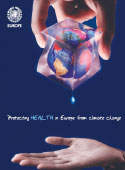Protecting health in Europe from climate change

Download
Edited by Bettina Menne, Franklin Apfel, Sari Kovats and Francesca Racioppi
2008, 51 pages
ISBN 978 92 890 7187 1
CHF 15.00
In developing countries CHF 10.50
Order no.13400077
Highly commended in the 2009 BMA Medical Book Competition, public health category
There is now scientific consensus that climate change affects health through changing weather patterns (for example, more intense and frequent extreme events) and indirectly through changes in water, air, food quality and quantity, ecosystems, agriculture, livelihoods and infrastructure. The effects will be unevenly distributed, and the people at greatest risk include the poor, very young, elderly and/or ill. Climate change can also pose a threat to health security. Failure to respond could be very costly in terms of disease, health care expenditure and lost productivity. This publication intends to stimulate debate and support an active response by providing up-to-date information on the health effects of climate change, as well as practical guidance on specific actions that decision-makers at different levels in health and other sectors can take now.
As long as climate change is not too rapid or strong, many of the health effects can be controlled by strengthening health systems. This can include strengthening preparedness, public health services and health security, advocating action in other sectors to benefit health, better informing citizens and leading by example. Health systems need to strengthen their capacity to assess potential climate-related health effects, to review their capacities to cope, and develop and implement adaptation and mitigation strategies, and to strengthen a range of key areas of work – from disease surveillance and control to disaster risk reduction – that are essential for rapid detection of and action against climate-related risks.



